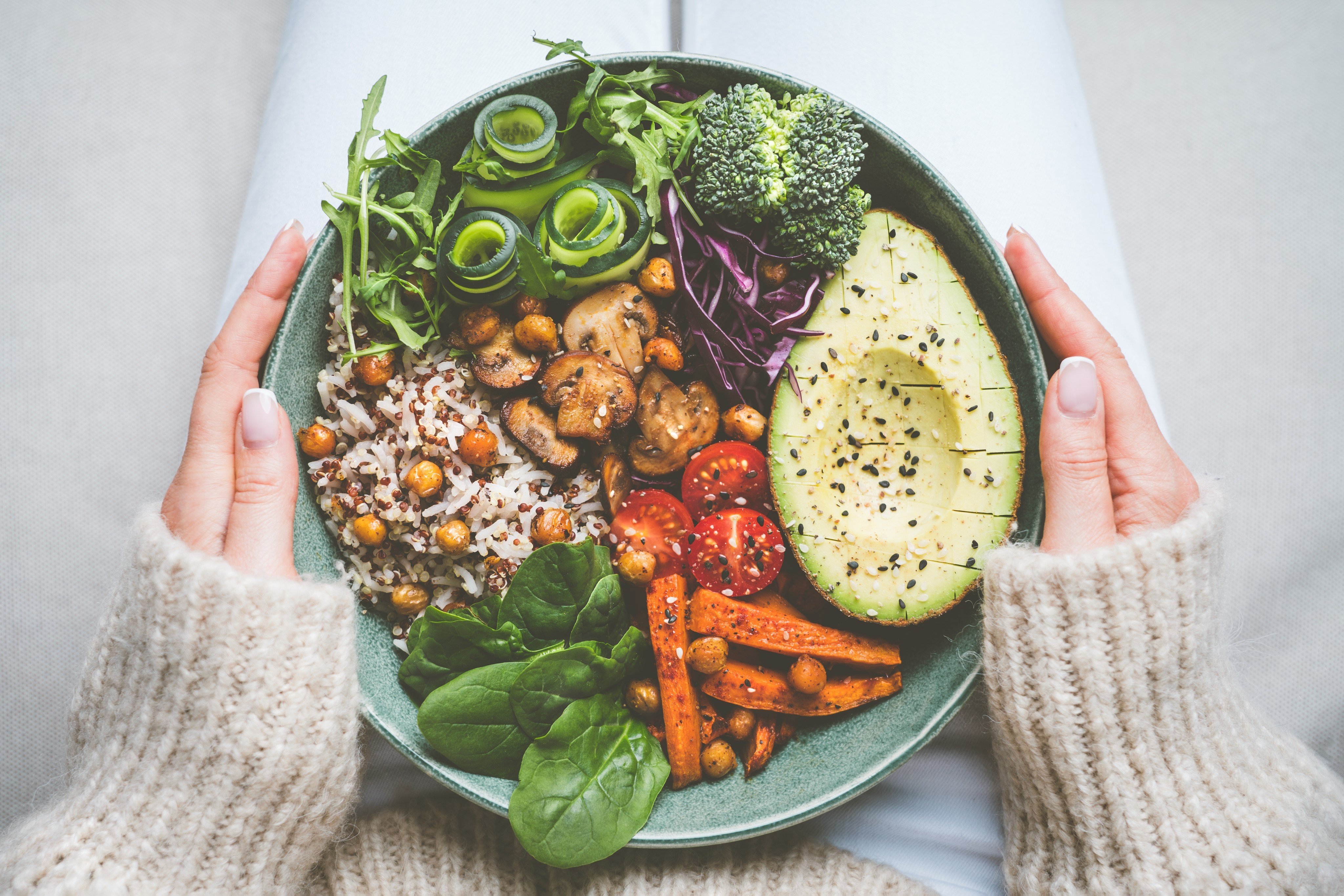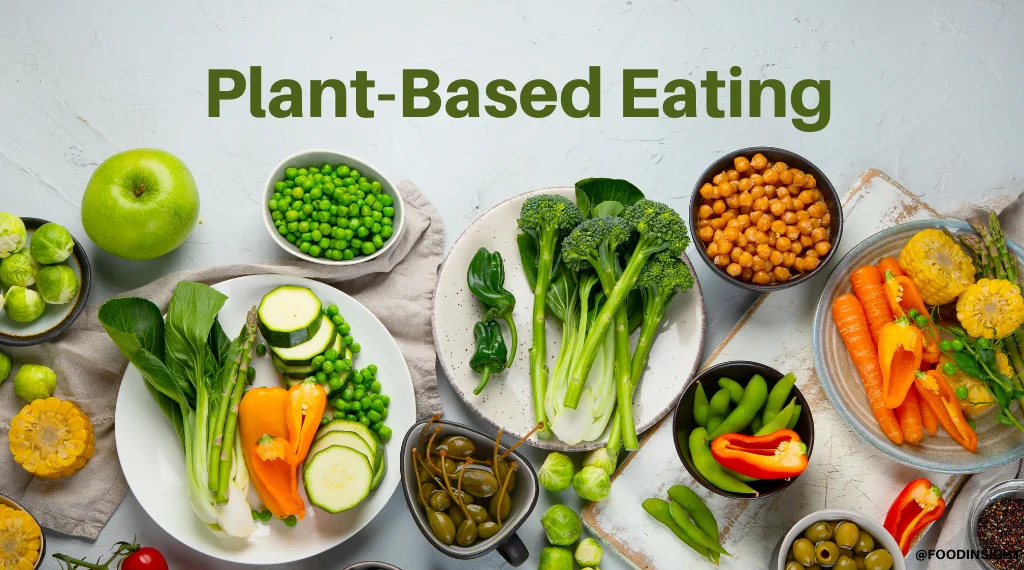Foods originating from plants—such as fruits, vegetables, whole grains, legumes, nuts, and seeds—form the backbone of a vegetarian diet. It reduces or excludes meat, dairy, seafood, and eggs among other animal products. The few possible health advantages this diet offers—weight control and a lower risk of some diseases—have helped it to become more popular.
Plant-based diets are also thought to be more ecologically friendly as they emit less greenhouse gasses and call for less resources when grown. Many individuals have also started this eating style from ethical qualms about animal cruelty.
Definition Of A Plant-based Diet
Eating foods derived from plants—fruits, vegetables, cereals, legumes, nuts, seeds—is emphasised in a plant-based diet. Because it emphasizes natural, unprocessed foods and steers clear of sugary, fatty, and overly processed meals, it is a healthy diet.
Eating a plant-based diet motivates you to consume a great range of vivid plant foods akin to natural multivitamins. Packed with vitamins, minerals, fiber, and antioxidants that maintain your health are they are.
This kind of diet supports excellent digestion and can also help you keep a reasonable weight. Furthermore low in saturated fats and cholesterol, this diet is heart-friendly. Furthermore shielding you from many ailments are the antioxidants found in plant diets.
Whole-Food Plant-Based Diet Health Effects

1. May Encourage Cardiovascular Health
Benefits for heart health abound from a whole-food plant-based diet. Studies show that this diet may drastically lower risk factors for heart disease including raised blood pressure and high LDL (bad) cholesterol levels. Those following a plant-based diet had a lower risk of heart disease, according a study that was written up in the Journal of the American Heart Association This is ascribed to the lack of saturated fats in animal products and the profusion of heart-protective elements like fiber, antioxidants, and unsaturated fats in plant-based meals.
2. May Advance Brain Health
Plant-based diets boost brain function. Those who consume more of plant-based meals do better on cognitive tests and are less likely to develop memory deterioration with age, according a 2014 Frontiers in Aging Neuroscience research.
3. Promotes Type 2 Diabetes Management
Promising in preventing and controlling type 2 diabetes, whole-food plant-based diets have Plant-based meals' great fiber count also aids in blood sugar management and insulin sensitivity enhancement. Furthermore, a research that was written up in the Journal of Geriatric Cardiology found that those on plant-based diets had a reduced type 2 diabetes risk—7. The diet calls for consumers to cut their consumption of processed foods, which are heavy in refined sugars and bad fats, therefore improving blood sugar control and management.
4. Could Lower Cancer Risk
According to a research, a varied plant-based diet lowers certain cancer risk. Rich in antioxidants and fiber, plant-based diets have shown defense against colon, prostate, and breast tumors. This is so because substances included in plant diets could fight the body's mechanisms encouraging cancer. Furthermore reducing cancer risk include eliminating processed meats and high-fat animal products.
5. Could extend lifespan
A longer life is connected to following a whole-food plant-based diet. Studies of people following these eating regimens reveal a lower general death risk.The diet's good effects on weight control, heart health, and chronic disease prevention taken together help to increase longevity. Furthermore, plant-based diets are ideal for individuals who want to live a longer, better life as their anti-inflammatory and nutrient-dense qualities significantly boost general well-being and longevity.
6. May Enhance Function of the Immune System
Essential elements that boost the immune system found in a plant-based diet include phytonutrients, minerals, and vitamins. These elements strengthen the defenses of the body against illnesses and infections. Studies confirm the immune-boosting properties of plant-based diets, which explains their popularity in increasing general health.
7. Works to lower inflammation.
Many different health issues are caused in part by chronic inflammation. Anti-inflammatory elements included in plant-based meals help to reduce inflammatory reactions by means of polyphenols and omega-3 fatty acids. These substances help to lower inflammatory indicators, therefore lowering the risk of disorders like diabetes and heart disease.
8. Enhances the cholesterol profile
Your cholesterol might drop on a plant-based diet. Plant-based foods decrease dietary cholesterol than animal-based meals and could help lower LDL (bad) cholesterol levels in the body. This helps to present a better cholesterol profile.
9. Improve stomach health
Plant-based diets abound in vital elements like polyphenols, prebiotics, and fiber. These components are absolutely essential for the support of good gut flora that enhances digestion. Furthermore improved is vitamin absorption, and stomach discomfort danger is lowered. Therefore, stressing plant-based foods in your diet helps your digestive system and general health by means of active contribution.
Before beginning a plant-based diet, you need be aware of a few things so you may enjoy all these advantages. To learn more, see the next section.
How Beginning a Plant-Based Diet

-
Start your education on plant-based diet first. To keep inspired, know the main ideas and advantages of this diet.
-
Correct Your Procedure: Choose your approach to the change. Some begin with progressively cutting meat and dairy, then make a sudden change. While you decide what fits you best, keep in mind to create reasonable and attainable objectives.
-
Create your meal schedule. Plan meals using a range of plant-based ingredients. Add fruits, vegetables, whole grains, lentumes, nuts, seeds. Play about with many recipes to keep dinners interesting.
-
Stow Your Kitchen: Plant-based basics include beans, lentils, quinoa, tofu, and lots of fresh vegetables should abound in your cupboard and refrigerator.
-
Examine labels: Watch for secret animal components in processed meals. Review labels for components including whey, rennet, and gelatin.
-
Search plant-based substitutes for meat, dairy, and eggs including tofu, tempehi, almond milk, and veggie burgers.
-
Eat Out Smart: Search for eateries offering plant-based cuisine. Many places these days have vegan and vegetarian options.
-
Stay Hydrated: You really need water. Have lots of it all through the day. To acquire some additional nutrients, you may also toss fruits into your water.
-
Add Thoughtfully: Given that plant-based diets lack naturally occurring vitamin B12, think about a supplement. See a doctor for direction.
-
Ask For Help: For guidance, recipes, and support, get in touch with a registered dietician or the plant-based society. One can find great value online forums and on social media.
-
Apart from applying all these guidelines, you need also be aware of the foods fit for a plant-based diet. Look over them in the part below.
Plant-Based Diet for Reduced Weight
-
This diet raises the gastrointestinal hormones linked in the control of glucose metabolism and satiety.
-
Plant-based diets minimize saturated fat intake, which is well recognized to cause weight gain.
-
Reducing processed foods, which are known to induce weight gain, either minimizes or eliminates them on this diet, therefore lowering total calorie intake and encouraging weight reduction.
-
Studies reveal that those on plant-based diets often have a lower body mass index (BMI)i and run a lesser risk of obesity.
-
Sustainable is: When paired with portion management and consistent exercise, plant-based diets help to sustain steady weight reduction.
-
Following a diet tailored to offer adequate nutrients in all the meals of the day can help you to enjoy the advantages of a plant-based diet. View the sample meal plan in the part below.
Recipes For A Plant-based Diet
Breakfast Might Be Vegan Overnight Oats

Comforts
-
half-cup rolled oats
-
One cup almond milk, or any plant-based milk.
-
Chia seeds in one tablespoon
-
One half a teaspoon vanilla essence
-
Some mixed berries
-
1 optional tbsp maple syrup
-
chopped nuts (like walnuts or almonds) to garnish
Techniques for Getting Ready
-
In an airtight jar mix oats, almond milk, chia seeds, and vanilla essence.
-
Well stir; cover the container. Stow it in the refrigerator overnight.
-
Give it a nice stir first thing in morning. Add extra almond milk if it seems very thick.
-
Top with mixed berries, chopped nuts, a sprinkle of maple syrup (if wanted). Savor a substantial and healthy breakfast.
-
Lunch calls for a quinoa and chickpea salad.
Components
-
One cup of quinoa cooked
-
One can (15 ounces) chickpea, washed and drained
-
One cup cherry tomatoes, halved one cucumber, sliced one half red onion finely.
-
Fresh parsley cut
-
juice from one lemon
-
Two teaspoons more virgin olive oil.
-
Taste salt and pepper.
How To Get Ready?
-
In a large bowl toss the cooked quinoa, chickpeas, cherry tomatoes, cucumbers, red onion, and fresh parsley.
-
Whisk together olive oil and lemon juice in a small bowl. Season with pepper and salt.
-
Drizzle the dressing over the salad and stir-through. If necessary, change the seasonings.
-
Before serving, chill in the refrigerator at least half an hour.
Read Also: Ensuring Food Safety with Preservatives
Ad Benefits and Drawbacks of a Plant-Based Diet

Cons
-
Choosing a plant-based diet could help your heart greatly. It lowers cholesterol and saturated fats that clogged arteries, therefore lowering the risk of heart illnesses.
-
Plant-based diets may be your friend whether you want to keep a good weight or drop some pounds. Often high in fiber and low in calories, they help you feel full while controlling your calorie count.
-
These diets provide a built-in barrier against high blood pressure, certain malignancies, and type 2 diabetes as well as other chronic conditions. It's akin to your health's long-term insurance policy.
-
Another earthy decision is to go plant-based. It's a green decision as it produces less greenhouse gas emissions and calls for less resources.
-
Many people choose a plant-based diet in order to match their food choices with ethical issues concerning animal care. This is a way of life that personally makes sense.
Cons
-
Plant-based diets have many advantages, but they also need for careful nutritional planning to guarantee you obtain key minerals such vitamin B12, iron, iodine, omega 3, zinc, choline, and calcium. A poorly followed diet could cause nutritional deficits.
-
Eating out or negotiating social events might need some more work as plant-based choices can be few. Still, you may enjoy group meals with some smart preparation.
-
Your digestive system might require some time to adjust to increasing fiber consumption as you embrace more plant-based foods. Because of the higher fiber level, it's like a mild prod for your stomach and could change your bowel motions.
-
Processed foods used in plant-based diets may be heavy in sweets, bad fats, or additives. One must pick intelligently and give whole, natural foods first priority.
-
Changing to a plant-based diet might draw some questions if your family or cultural customs revolve on meat-based meals. Ready for some family talks?
-
The plant-based diet's adaptability and range of advantages are helping it to become more and more popular. It advises you to consume a range of low-calorie fruits, vegetables, and plant-based foods rich in vitamins yet low in calories. This diet offers a wide range of items to pick from, and you can create some delicious meals without sacrificing taste. Furthermore, many find it beneficial as ingesting animal products allows flexibility unlike that of a vegan diet. One drawback of this diet, though, is certain vitamin shortages that must be addressed. See your healthcare provider for appropriate direction to help to reduce this.




